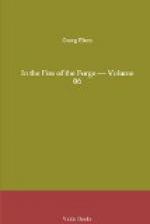Every drop of blood receded from the Minorite’s fever-flushed cheeks, and the page was about to spring from his saddle to support him, but the monk waved him back impatiently, and by the exertion of all his strength of will forced himself to stagger on.
He had just felt happy in the heart of eternal love; but now the expression of his countenance changed, and his dark, sunken eyes flashed angrily.
The faded woman beside the duchess bore the name of the lady whose faithlessness had first induced him to seek rest and forgetfulness in the peace of the cloister, and led him to despise her whole sex.
The horsewoman must be a granddaughter, daughter, or niece of the woman who had so basely betrayed him. How much she resembled the traitress, but she did not understand how to hide her real nature as well; her faded features wore a somewhat malicious expression. The resentment which he thought he had conquered again awoke. He would have liked to rush after her and call her to her face——. Yet what would that avail? How was she to blame for the treachery of another person, whom perhaps she did not even know?
Yet he longed to follow her.
His fevered blood urged him on, but his exhausted, aching limbs refused to serve him. One more violent effort, and sparks flashed before his eyes, his lips were wet with blood, and he sank gasping on the ground.
After some time he succeeded in dragging himself to the side of the road, where he lay until a Nuremberg carrier, passing with his team of four horses, lifted him, with the help of his servant, into his cart and took him on.
At Schweinau the jolting of the vehicle became unendurable to the sufferer, and the carrier willingly fulfilled his wish to be taken to the hospital where mangled criminals, tortured by the rack, were nursed.
There, however, they instantly perceived that his place was not in this house dedicated to criminal misfortune, and the kind Beguines of Schweinau took charge of him.
On the way the old monk suffered severely in both soul and body. It seemed like treason, like a rejection of his pure and pious purposes, that Heaven itself barred the path along which he was wearily wandering to win it a soul.
CHAPTER VI.
The entombment of the magnificent coffin of Frau Maria Ortlieb under the pavement of the family chapel was over. The little group of sympathising friends had left the church. Only the widower and his daughters remained, and when he knew that he could no longer be seen by the few who still lingered in the house of God, he clasped the two girls to his heart with a suppressed sob.
Never had he experienced such deep sorrow, such anguish of soul. He had not even been permitted to take leave of his beloved companion with unmixed grief; fierce resentment had mingled with his trouble.




